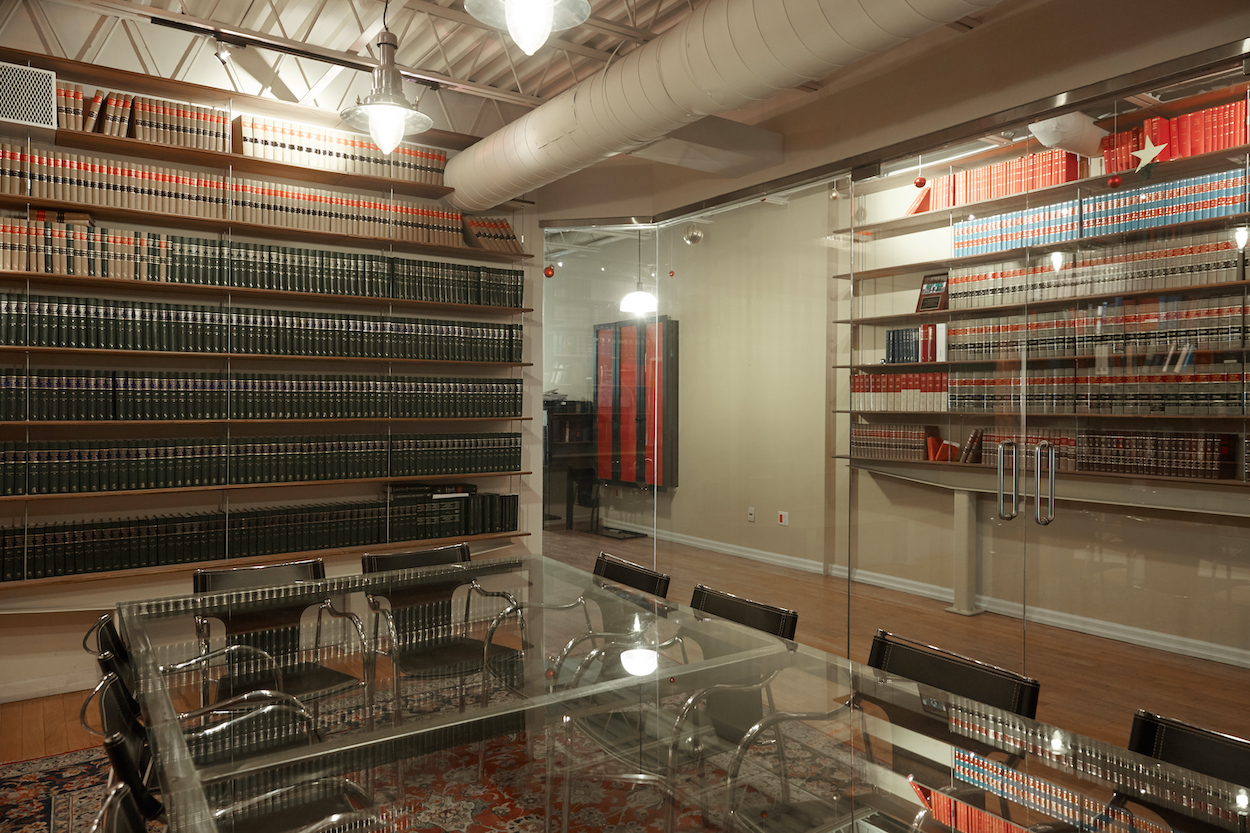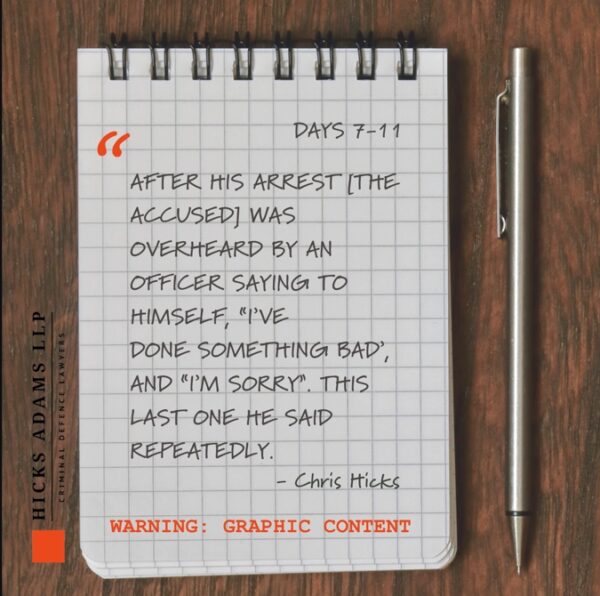Criminal defence lawyer and partner at Hicks Adams LLP Christopher Hicks has written a series of journal entries to take readers behind the scenes of something few people have exposure to: a trial for first-degree murder. In these journals, readers will experience the daily progress of a trial from the defence lawyer’s point of view, with the lawyer’s perspective on everything including witness testimony, judicial rulings and legal strategy.
Making this series especially unique is the fact that this is the first jury trial to go forward in Ontario after the start of the Covid-19 pandemic. With new safety protocols in place, everything is different from the placement of the jury, the lack of observers in the public gallery and even the freedom of movement for the lawyers.
In a nine-part series, Christopher Hicks will take readers through the highly unusual process of running a murder trial during a pandemic, providing rare insights and information as you follow along on the journey from start to finish. See previous installments by clicking on the links below:
Warning: This post contains graphic descriptions that may be difficult for sensitive readers.
DAY 7
Detective Sergeant Tweedie had Robbie McGregor into the Peterborough police station to interview him about the disappearance of Joanne MacKenzie. He knew Robbie McGregor’s version of the events of Saturday morning in the Tim Horton’s parking lot from other investigators. Tweedie did not yet have the surveillance video from the parking lot, but he was skeptical by nature.
He didn’t believe McGregor because firstly, after being beaten by 5 or 6 guys in the parking lot, he had no injuries. Not one. The police mind is highly skeptical, and suspicion runs very deep.
Detective Sergeant Tweedie personified these qualities. Tweedie listened to Robbie McGregor tell his tale again. Once McGregor was finished, Tweedie speculated correctly that the surveillance video he had not yet seen would not reveal McGregor getting beaten up in the parking lot but would instead show Joanne MacKenzie attending the lot and getting in McGregor’s truck. Robbie McGregor had no comment.
This interview lasted an hour and a half and at the end, Robbie McGregor left the station. He was not arrested until the next afternoon after Tweedie had actually seen the parking lot surveillance video, confirming his suspicion that McGregor had been lying. Eventually, a jury would see Robbie McGregor lying through his teeth about the most important event in several lives.
After his arrest, Robbie McGregor was overheard by an officer saying to himself, “I’ve done something bad’, and “I’m sorry”. This last remark was made repeatedly.
DAY 8
Four days after she had last been seen on Saturday, July 2, shortly after 9:00 a.m., Joanne MacKenzie’s body was found in a wooded area 300 metres across an open field from Robbie McGregor’s farm.
It was a wet swampy area, and her body was in a shallow grave covered by tree branches. She was fully clothed, and her head and torso were encased in a garbage bag. Her body bore 17 wounds.
Searchers later found other items belonging to Joanne MacKenzie nearby: flip flops, a hairband, and a pair of glasses.
DAY 9
Amanda Watson and her husband were friends of Robbie McGregor, who attended their home with his daughter for a barbeque shortly after the Canada Day weekend. McGregor had complained to Watson of two incidents concerning Jessup and McGregor’s daughter: one a mild physical touching but the second a more intrusive sexual touching.
However, Watson was not certain of the timing of the latter incident. The sexual touching may have been related to the Canada Day weekend, or it may have been earlier. If the former, it damaged the credibility of Robbie McGregor, who maintained he first knew of the sexual abuse the morning of July 2.
A series of witnesses from the Children’s Aid Society and Ontario Works testified for the prosecution. In March, Robbie McGregor had complained about deficits in his daughter’s school attendance after leaving the Peterborough area in the custody of her mother. In June, McGregor complained about Jessup’s presence around his daughter and the likelihood that Jessup was a drug dealer. He wanted to keep ‘bad people’ away from his daughter but did not want to keep Joanne MacKenzie from her daughter.
Robbie McGregor said that he and she were now in court, but he did not want full custody, only generous access.
DAY 10
Day 10 saw more details relating to the location of MacKenzie’s body and personal belongings.
Forensic officers searched the area contingent to the location of Joanne MacKenzie’s remains. An aerial photo revealed a blue tarp in a grass field close to a grove of trees. The tarp marked an area where the blood of Joanne MacKenzie was found, and close by a pair of flip flops, a hairband and a pair of glasses.
Forensic officers measured the distance from Robbie McGregor’s farm to the burial site (278 metres) and the distance from the open field to the burial site in the woods (39 metres).
DAY 11
James Pacey, Robbie McGregor’s stepfather, was present at the farm the fateful morning of July 2. Pacey testified that after talking to his mother, Crystal, and then to his daughter (Pacey was not privy to either conversation), Robbie McGregor was upset. He said it appeared his daughter had been sexually touched, and he called Joanne MacKenzie to arrange a meeting to deal with this possibility.
Robbie McGregor left the farm shortly after to drive to Peterborough to rendezvous with Joanne MacKenzie.
Joe Williams was a friend of Robbie McGregor and was a big part of his life. On the evening of July 1, Robbie McGregor’s fiancée, Amanda Wells, called Williams and told him that Robbie McGregor wanted him to harm Joanne MacKenzie and Jessup because of the alleged molestation of his daughter.
Williams declined. Jessup was also a friend of Williams. Robbie McGregor did not contact Williams directly about this plot.
Stay tuned for future installments in this series, which will be posted every Monday.
Christopher Hicks is one of the founding partners of the criminal law firm of Hicks Adams. He has been practicing criminal law for more than two and a half decades, with a special interest, and extensive experience, in jury trials and appeals. In the course of his career, Christopher has been involved in scores of jury trials involving the most serious crimes in the criminal code, has argued appeals of both conviction and sentence in the court of appeal on a regular basis, and has represented clients in the Supreme Court of Canada on more than a half dozen occasions.
To reach Christopher or any of the experienced and dedicated criminal lawyers at Hicks Adams, contact the firm at 416-975-1700 or online to discuss your matter in confidence.



